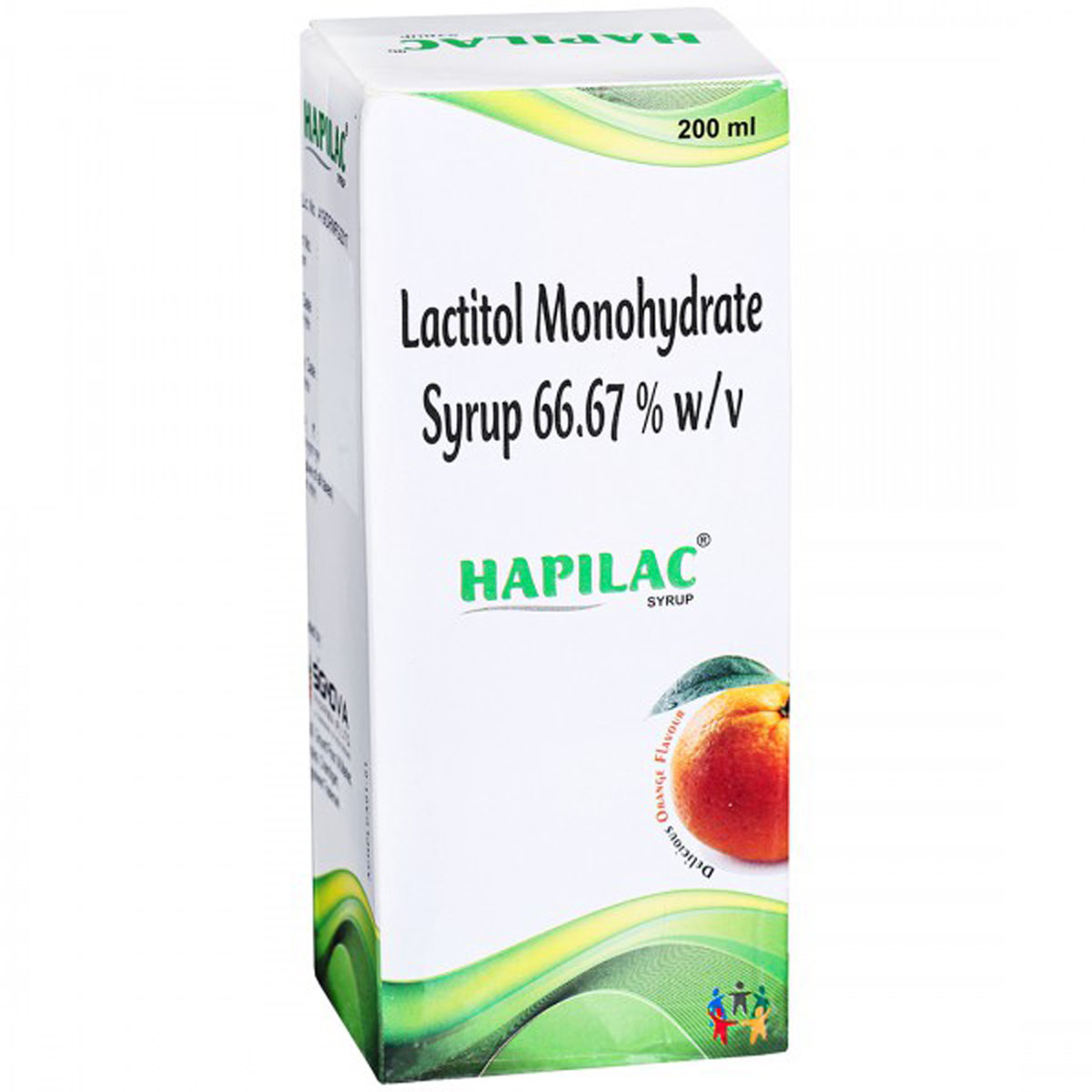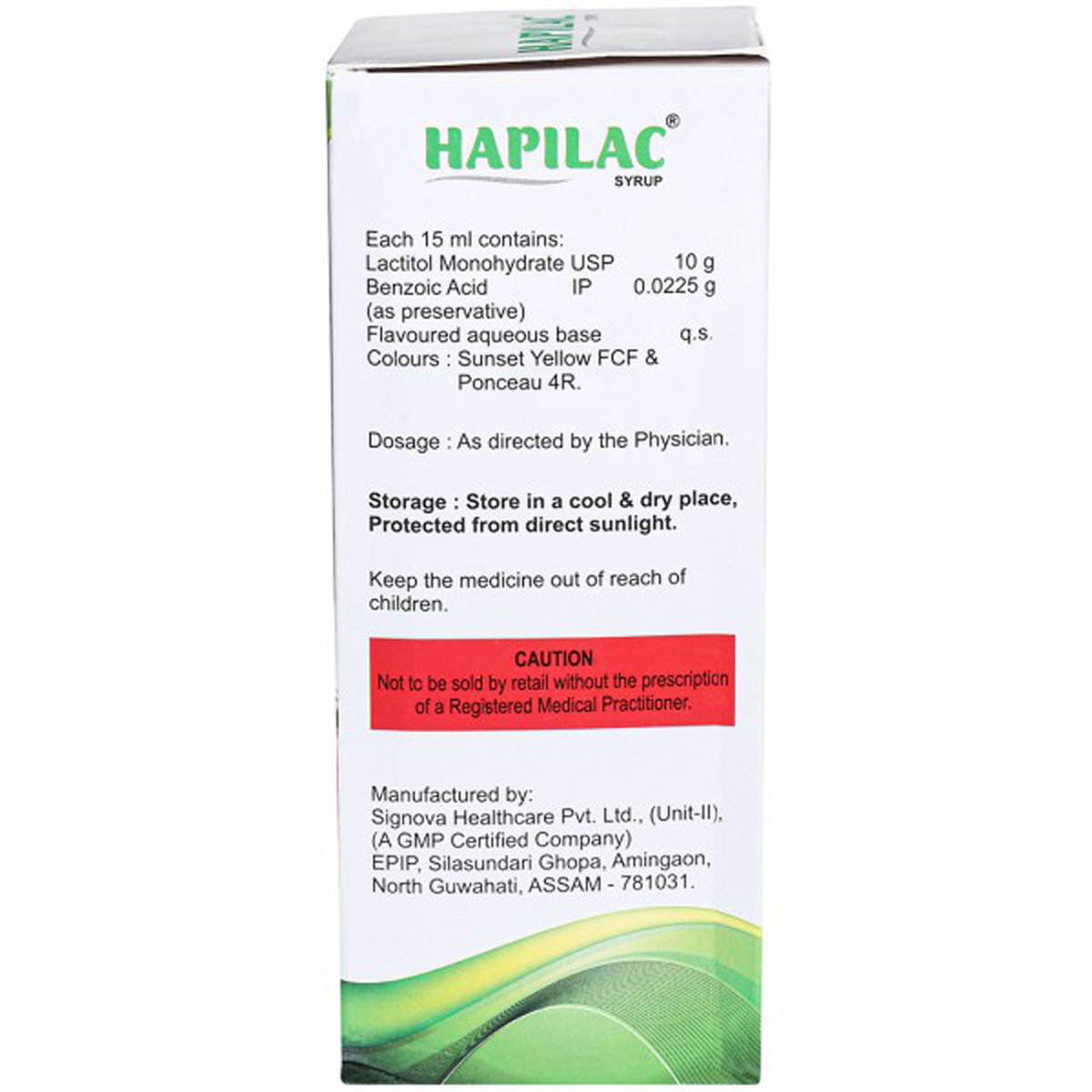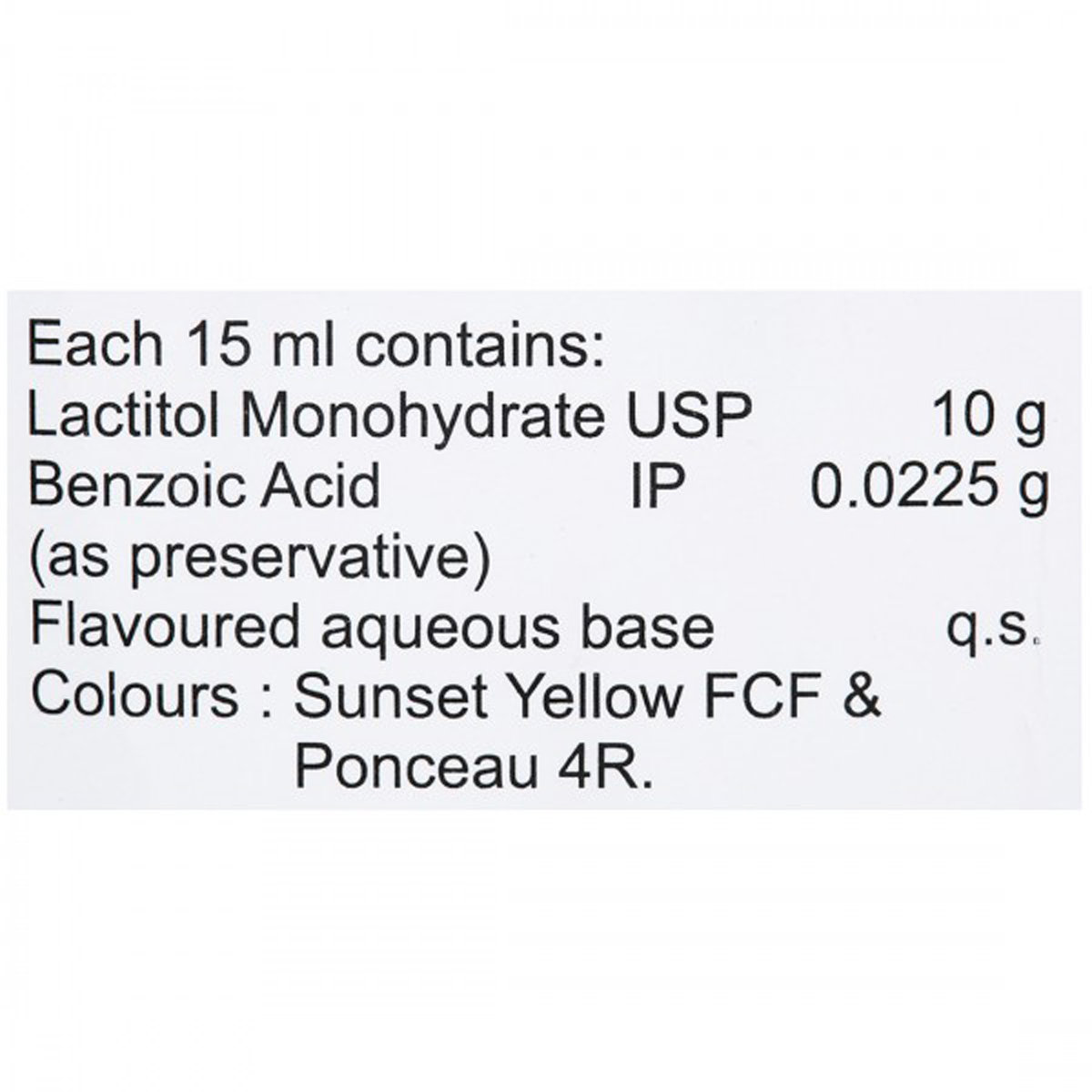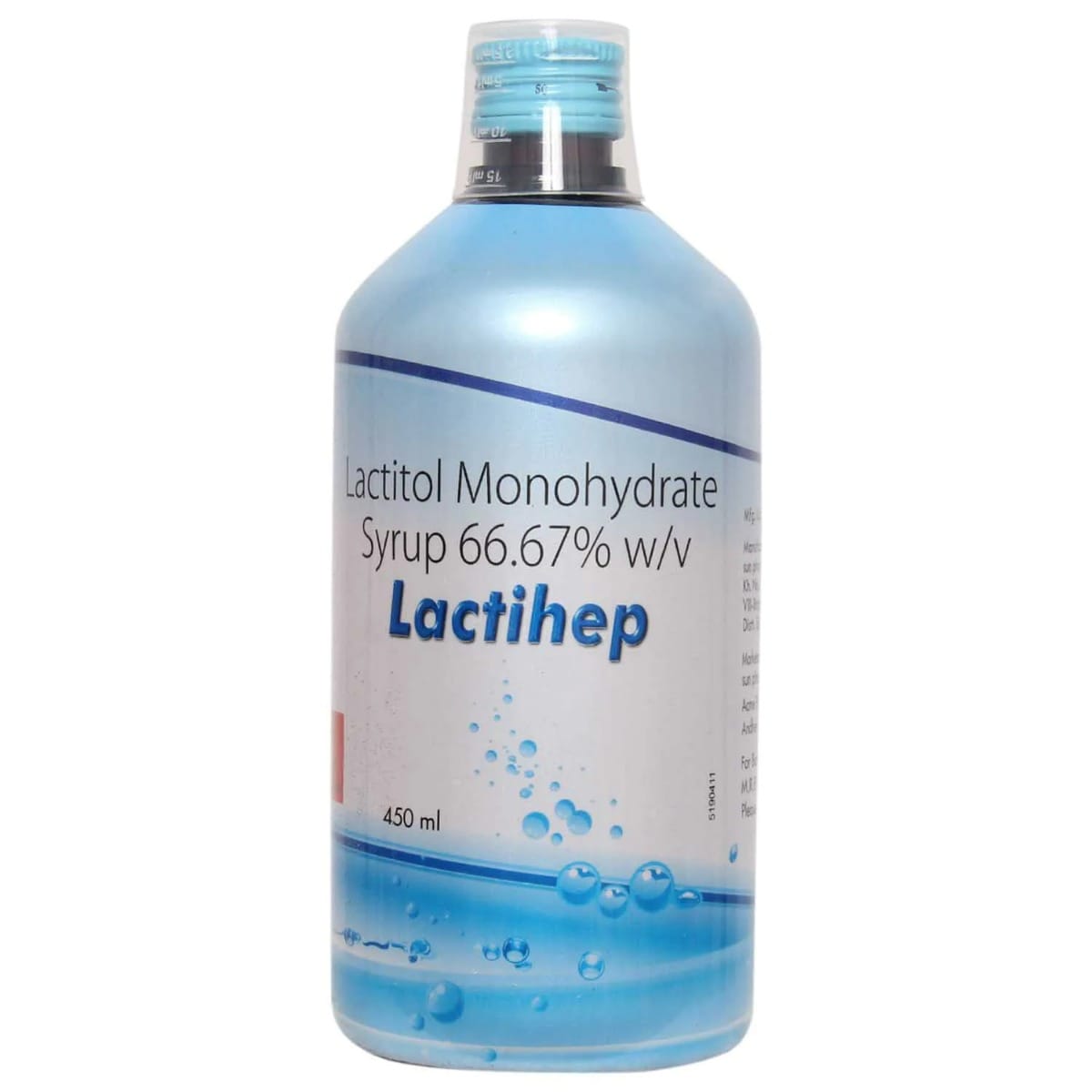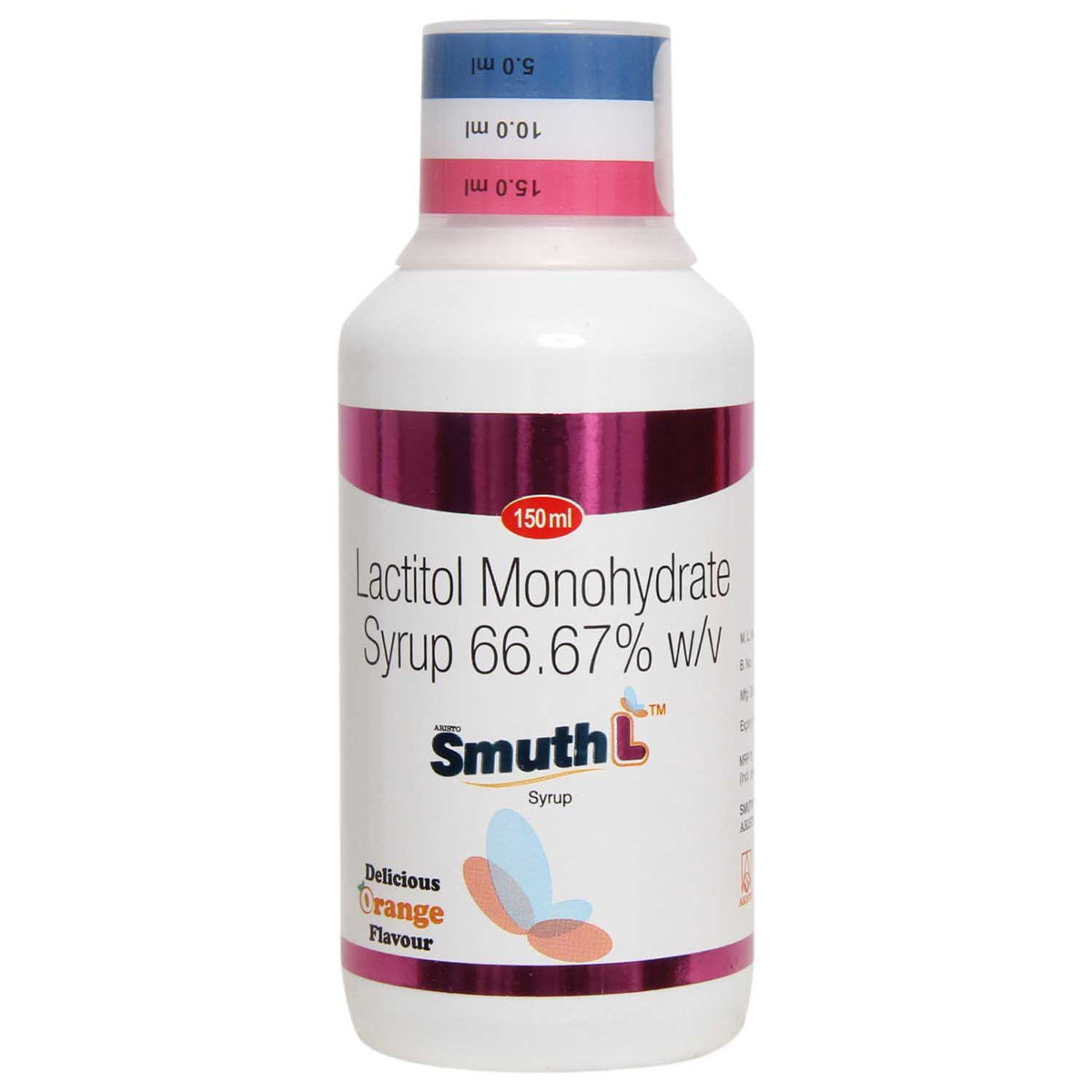Hapilac Orange Syrup 200 ml
MRP ₹283
(Inclusive of all Taxes)
₹42.5 Cashback (15%)
About Hapilac Orange Syrup
Hapilac Orange Syrup belongs to the group of medicines called laxatives used to treat constipation. Additionally, Hapilac Orange Syrup is also used to prevent hepatic encephalopathy (decreased brain function due to liver disease). Constipation refers to infrequent bowel movements in which the stools are often dry, painful, and hard to pass. Hepatic encephalopathy is a liver disease in which the liver does not remove toxins from the body, which leads to loss of brain function.
Hapilac Orange Syrup contains Lactitol, a disaccharide sugar that breaks down into low-molecular-weight organic acids in the colon, increasing the osmotic pressure. This causes an increase in water content in stools, and stool volume, thereby makes the stool softer and more comfortable to pass and provides relief from constipation. In patients with hepatic encephalopathy, Lactitol lowers the colon pH, thereby suppressing the absorption of unionized ammonia and other toxins. It also enhances nitrogen excretion through faeces.
Take Hapilac Orange Syrup as prescribed by your doctor. Try to take the Hapilac Orange Syrup at a fixed time for the best results. You are advised to take Hapilac Orange Syrup for as long as your doctor has prescribed it for you, depending on your medical conditions. You may experience certain common side effects in some cases, such as abdominal distension, cramps, and flatulence (gas). Most of these side effects do not require medical attention and will resolve gradually over time. However, you are advised to talk to your doctor if you experience these side effects persistently.
To treat your condition effectually, continue taking Hapilac Orange Syrup for as long as your doctor has prescribed. Drink plenty of fluids (at least 6-8 glasses) while taking Hapilac Orange Syrup . Consult your doctor before taking Hapilac Orange Syrup if you are pregnant or breastfeeding, and your doctor will prescribe you Hapilac Orange Syrup only if the benefits outweigh the risks. Inform your doctor if there is no bowel movement or if you find rectal bleeding after taking Hapilac Orange Syrup . Do not take Hapilac Orange Syrup for more than a week as it might cause dependency on Hapilac Orange Syrup for a bowel movement.
Country of origin
Manufacturer/Marketer address
Online payment accepted

secured payment

india's most trusted pharmacy

genuine products
Composition :
Manufacturer/Marketer :
Consume Type :
Expires on or after :
Return Policy :
Provide Delivery Location
About Hapilac Orange Syrup
Hapilac Orange Syrup belongs to the group of medicines called laxatives used to treat constipation. Additionally, Hapilac Orange Syrup is also used to prevent hepatic encephalopathy (decreased brain function due to liver disease). Constipation refers to infrequent bowel movements in which the stools are often dry, painful, and hard to pass. Hepatic encephalopathy is a liver disease in which the liver does not remove toxins from the body, which leads to loss of brain function.
Hapilac Orange Syrup contains Lactitol, a disaccharide sugar that breaks down into low-molecular-weight organic acids in the colon, increasing the osmotic pressure. This causes an increase in water content in stools, and stool volume, thereby makes the stool softer and more comfortable to pass and provides relief from constipation. In patients with hepatic encephalopathy, Lactitol lowers the colon pH, thereby suppressing the absorption of unionized ammonia and other toxins. It also enhances nitrogen excretion through faeces.
Take Hapilac Orange Syrup as prescribed by your doctor. Try to take the Hapilac Orange Syrup at a fixed time for the best results. You are advised to take Hapilac Orange Syrup for as long as your doctor has prescribed it for you, depending on your medical conditions. You may experience certain common side effects in some cases, such as abdominal distension, cramps, and flatulence (gas). Most of these side effects do not require medical attention and will resolve gradually over time. However, you are advised to talk to your doctor if you experience these side effects persistently.
To treat your condition effectually, continue taking Hapilac Orange Syrup for as long as your doctor has prescribed. Drink plenty of fluids (at least 6-8 glasses) while taking Hapilac Orange Syrup . Consult your doctor before taking Hapilac Orange Syrup if you are pregnant or breastfeeding, and your doctor will prescribe you Hapilac Orange Syrup only if the benefits outweigh the risks. Inform your doctor if there is no bowel movement or if you find rectal bleeding after taking Hapilac Orange Syrup . Do not take Hapilac Orange Syrup for more than a week as it might cause dependency on Hapilac Orange Syrup for a bowel movement.
Uses of Hapilac Orange Syrup
Key Benefits
Hapilac Orange Syrup belongs to the group of medicines called laxatives used to treat constipation. Additionally, Hapilac Orange Syrup is also used to prevent hepatic encephalopathy (decreased brain function due to liver disease). Hapilac Orange Syrup contains Lactitol (laxative). Lactitol is a disaccharide sugar. It works by breaking down into low-molecular-weight organic acids in the colon, which increases the osmotic pressure. This causes an increase in water content in stools, and stool volume, thereby makes the stool softer and more comfortable to pass and provides relief from constipation. In patients with hepatic encephalopathy, lactitol lowers the colon pH, thereby suppresses the absorption of unionized ammonia and other toxins. It also enhances nitrogen excretion through faeces.
Directions for Use
Storage
Side Effects of Hapilac Orange Syrup
- Flatulence (wind)
- Abdominal pain
- Abdominal cramps
- Indigestion
- Dehydration
Drug Warnings
Do not take Hapilac Orange Syrup if you are allergic to any of its contents. Consult your doctor before taking Hapilac Orange Syrup if you are pregnant or breastfeeding; your doctor will prescribe you Hapilac Orange Syrup only if the benefits outweigh the risks. Do not take Hapilac Orange Syrup in case of ileostomy or colostomy. Regularly monitor serum electrolytes, blood lactose, and blood glucose levels while taking Hapilac Orange Syrup . Talk to your doctor if there is no bowel movement or if you find rectal bleeding after taking Hapilac Orange Syrup . Do not take Hapilac Orange Syrup if you have galactosemia (galactose indigestion disorder), intestinal obstruction, unexplained abdominal pain, or bleeding. Inform your doctor if you have diabetes, or if you have to undergo a colonoscopy. Do not take Hapilac Orange Syrup for more than a week as it may cause dependency on Hapilac Orange Syrup for a bowel movement.
Drug Interactions
Drug-Drug Interaction: Hapilac Orange Syrup may have interaction with an antibiotic (neomycin), cardiac glycoside (digitalis), a drug used to treat ulcers (carbenoxolone), anti-fungal (amphotericin B), corticosteroids, and thiazide diuretics.
Drug-Food Interaction: No interactions found/established.
Drug-Disease Interaction: Hapilac Orange Syrup may have interactions with irritable bowel syndrome, intestinal obstruction disorder, diabetes, and galactosemia (galactose indigestion disorder).
Drug-Drug Interactions Checker List
- NEOMYCIN
- DIGITALIS
- CARBENOXOLONE
- AMPHOTERICIN B
Habit Forming
Diet & Lifestyle Advise
- Try maintaining a balanced diet which includes fresh fruits and vegetables.
- Stay hydrated, and drink enough water and fluids.
- Exercise regularly, and stay fit.
- Get enough sleep.
- Trying to make time to empty your bowels whenever the body tells you to.
- Eat fibre-rich foods such as whole-wheat bread, oatmeal, flaxseed, nuts, beans, lentils, fruits (berries, apples, oranges, bananas, pears, figs), and vegetables (broccoli, spinach, sweet potatoes, avocados).
Special Advise
Maintain adequate fluid intake while taking Hapilac Orange Syrup .
Disease/Condition Glossary
Constipation: It refers to infrequent bowel movements. The stools are often dry, painful, and hard to pass. Constipation is a condition in which the person has fewer than three bowel movements in a week. However, bowel patterns may vary from person to person. Symptoms include bloating, abdominal pain, and feeling as if the bowel movement is incomplete. Constipation occurs when the normal muscle contractions in the large intestine slow down, which causes the incomplete elimination of the bowel from the body. Constipation could be associated with a sudden change of diet, a diet with less fiber, not drinking enough liquids, lack of exercise, loss of tone of the bowel muscles in older people, or staying in bed for a longer duration.
Liver encephalopathy: It is a liver disease in which the liver does not remove the toxins from the body, which leads to loss of brain function.
FAQs
Disclaimer
Alcohol
Safe if prescribed
The interaction of alcohol with Hapilac Orange Syrup is unknown. Please consult a doctor before consuming alcohol while using Hapilac Orange Syrup .
Pregnancy
Consult your doctor
Please consult your doctor before taking Hapilac Orange Syrup if you are pregnant, your doctor will prescribe you Hapilac Orange Syrup if the benefits outweigh the risks.
Breast Feeding
Consult your doctor
It is generally safe to take Hapilac Orange Syrup if you are breastfeeding. However, please consult your doctor before taking Hapilac Orange Syrup if you are breastfeeding, your doctor will prescribe you Hapilac Orange Syrup if the benefits outweigh the risks.
Driving
Safe if prescribed
Hapilac Orange Syrup has negligible influence in your ability to drive.
Liver
Consult your doctor
Hapilac Orange Syrup is safe to use if prescribed by the doctor. Please consult your doctor if you have a liver impairment or any concerns regarding this.
Kidney
Consult your doctor
Hapilac Orange Syrup is safe to use if prescribed by the doctor. Please consult your doctor if you have kidney impairment or any concerns regarding this.
Children
Safe if prescribed
Hapilac Orange Syrup can be taken by children if prescribed by a doctor.
Author Details
We provide you with authentic, trustworthy and relevant information
Uses of Hapilac Orange Syrup
Key Benefits
Hapilac Orange Syrup belongs to the group of medicines called laxatives used to treat constipation. Additionally, Hapilac Orange Syrup is also used to prevent hepatic encephalopathy (decreased brain function due to liver disease). Hapilac Orange Syrup contains Lactitol (laxative). Lactitol is a disaccharide sugar. It works by breaking down into low-molecular-weight organic acids in the colon, which increases the osmotic pressure. This causes an increase in water content in stools, and stool volume, thereby makes the stool softer and more comfortable to pass and provides relief from constipation. In patients with hepatic encephalopathy, lactitol lowers the colon pH, thereby suppresses the absorption of unionized ammonia and other toxins. It also enhances nitrogen excretion through faeces.
- Eat smaller, more frequent meals.
- Eat slowly and chew your food thoroughly to help digestion.
- Eat fiber-rich foods such as fruits, whole grains, and vegetables to promote regular bowel movements.
- Avoid gas-producing foods like cabbage, beans, broccoli and carbonated drinks.
- Drink lots of water throughout the day to prevent dehydration and aid digestion.
- Do regular exercise to enhance digestion and reduce bloating.
- Drink water or other clear fluids.
- To prevent worsening of pain, limit intake of tea, coffee, or alcohol.
- Include bland foods like rice, toast, crackers, and rice in your diet.
- Avoid lying down immediately after eating as it may cause indigestion or heartburn.
- Avoid acidic and spicy food as it may cause indigestion.
- Tell your doctor about your GAS symptoms. They may change your medication regimen or prescribe additional drugs to help you manage them.
- To manage GAS symptoms, eat a balanced diet of fibre, vegetables, and fruits.
- Drink enough water throughout the day to avoid constipation and treat GAS symptoms.
- Regular exercise like yoga and walking may help stimulate digestion and alleviate GAS symptoms.
- Take probiotics only if your doctor advises, as they may help alleviate GAS symptoms by promoting gut health.
- Take medication for GAS symptoms only if your doctor advises, as certain medications can interact with your existing prescriptions or worsen symptoms.
- If symptoms persist, worsen, or are accompanied by severe abdominal pain, vomiting, or bleeding, seek immediate medical attention.
- Increased creatinine levels must be corrected immediately with the help of a doctor.
- Reduce strenuous activities that can lead to muscle breakdown and production of creatinine.
- Sleep for 7-8 hours per night to assist your body in repairing and rebuilding tissue.
- Manage your blood pressure by implementing changes in lifestyle like losing weight, reducing stress and exercising regularly.
- Avoid smoking and drinking alcohol.
- Inform your doctor about the medication you're taking and the UTI symptoms you're experiencing.
- Your doctor may adjust your medication regimen or consider alternative medications or dosages that may reduce the risk of UTIs.
- Drink plenty of water (at least 8-10 glasses a day) to help flush out bacteria. Avoid sugary drinks and caffeine, which can exacerbate UTI symptoms.
- Urinate when you feel the need rather than holding it in. This can help prevent bacterial growth and reduce the risk of UTIs.
- Consider cranberry supplements: Cranberry supplements may help prevent UTIs by preventing bacterial adhesion.
- Monitor UTI symptoms and report any changes to your doctor.
- If antibiotics are prescribed, take them as directed and complete the full course.
- Inform your doctor about the symptoms you're experiencing due to medication.
- Your doctor may adjust your treatment plan, which could include changing your medication, adding new medications, or offering advice on managing your symptoms.
- Practice good hygiene, including frequent handwashing, avoiding close contact with others, and avoiding sharing utensils or personal items.
- Stay hydrated by drinking plenty of fluids to help loosen and clear mucus from your nose, throat, and airways.
- Get plenty of rest and engage in stress-reducing activities to help your body recover. If your symptoms don't subside or worsen, consult your doctor for further guidance.
Directions for Use
Storage
Drug Warnings
Do not take Hapilac Orange Syrup if you are allergic to any of its contents. Consult your doctor before taking Hapilac Orange Syrup if you are pregnant or breastfeeding; your doctor will prescribe you Hapilac Orange Syrup only if the benefits outweigh the risks. Do not take Hapilac Orange Syrup in case of ileostomy or colostomy. Regularly monitor serum electrolytes, blood lactose, and blood glucose levels while taking Hapilac Orange Syrup . Talk to your doctor if there is no bowel movement or if you find rectal bleeding after taking Hapilac Orange Syrup . Do not take Hapilac Orange Syrup if you have galactosemia (galactose indigestion disorder), intestinal obstruction, unexplained abdominal pain, or bleeding. Inform your doctor if you have diabetes, or if you have to undergo a colonoscopy. Do not take Hapilac Orange Syrup for more than a week as it may cause dependency on Hapilac Orange Syrup for a bowel movement.
Therapeutic Class
Drug-Drug Interactions
Drug-Drug Interactions
Login/Sign Up
Drug-Drug Interactions Checker List
- NEOMYCIN
- DIGITALIS
- CARBENOXOLONE
- AMPHOTERICIN B
Diet & Lifestyle Advise
- Try maintaining a balanced diet which includes fresh fruits and vegetables.
- Stay hydrated, and drink enough water and fluids.
- Exercise regularly, and stay fit.
- Get enough sleep.
- Trying to make time to empty your bowels whenever the body tells you to.
- Eat fibre-rich foods such as whole-wheat bread, oatmeal, flaxseed, nuts, beans, lentils, fruits (berries, apples, oranges, bananas, pears, figs), and vegetables (broccoli, spinach, sweet potatoes, avocados).
Habit Forming
Side Effects of Hapilac Orange Syrup
- Flatulence (wind)
- Abdominal pain
- Abdominal cramps
- Indigestion
- Dehydration
Special Advise
Maintain adequate fluid intake while taking Hapilac Orange Syrup .
Disease/Condition Glossary
Constipation: It refers to infrequent bowel movements. The stools are often dry, painful, and hard to pass. Constipation is a condition in which the person has fewer than three bowel movements in a week. However, bowel patterns may vary from person to person. Symptoms include bloating, abdominal pain, and feeling as if the bowel movement is incomplete. Constipation occurs when the normal muscle contractions in the large intestine slow down, which causes the incomplete elimination of the bowel from the body. Constipation could be associated with a sudden change of diet, a diet with less fiber, not drinking enough liquids, lack of exercise, loss of tone of the bowel muscles in older people, or staying in bed for a longer duration.
Liver encephalopathy: It is a liver disease in which the liver does not remove the toxins from the body, which leads to loss of brain function.
All Substitutes & Brand Comparisons
RX
Lactihep Syrup 450 ml
Sun Pharmaceutical Industries Ltd
₹548
(₹1.1/ 1ml)
13% CHEAPERRX
Smuth L Orange Syrup 150 ml
Aristo Pharmaceuticals Pvt Ltd
₹264.5
(₹1.59/ 1ml)
25% COSTLIER

Have a query?

